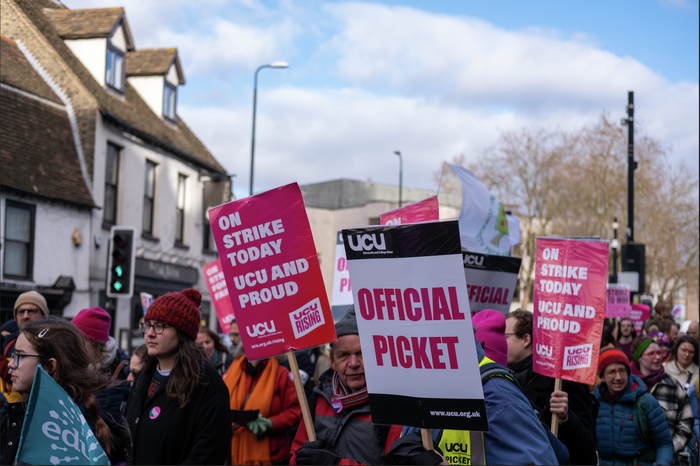Student journos should let their stories speak for themselves
In her outgoing editorial as Editor-in-Chief, Famke Veenstra-Ashmore argues that good stories don’t need sexing up

‘Newspapers, especially ones run by students, have a duty to be exciting [...] Their purpose is to provoke and shock,’ writes a previous Editor in his out-going comment piece. I certainly don’t reject the premise that student journalism should be exciting – or even a little provocative where effective. But I do find some cynicism growing when this is labelled a ‘duty’.
Are there any duties which we’re required to perform as student journalists? Claiming to defy authority rings hollow when in practice that means borrowing from the tabloid playbook. It might get us a few more clicks, or a couple of national bylines, but should this be the main motivator behind our paper’s reportage?
As we so often append to our promotional material, Varsity remains one of the only independent student papers in the UK. Detached from student unions, universities, or giant corporate structures, we are afforded a level of freedom unheard of in the vast majority of media outlets. And whilst what happens in the various recesses of Cambridge is not of interest to everyone, the city’s culture and climate has unrivalled influence on intellectual circles, social-issues of the day, and even our politics and government. It seems a missed opportunity if we occupy ourselves with performing a self-induced challenge to authority.
“We are afforded a level of freedom unheard of in the vast majority of media outlets”
That’s not to say that we should avoid the basic practice of holding the University and its institutions to account. We certainly haven’t shied away from challenging authority this term. Our first splash exposed a data leak in the SU, accusations of ballot tampering in the Cambridge Union were uncovered, and most recently, proposals on University legislation found themselves interrogated. This has all been done, however, not with a sense of duty to provoke and excite, but rather to increase public access to stories which would otherwise fly under the radar.
Accountability is about exposing failures and assigning responsibility, and is often the first-step in bringing about change. Influencing positive change is extremely exciting, and for me, much more exciting than shocking readers or challenging them with ideas they might find uncomfortable. If uncomfortable means controversial, it’s hard to justify that all these ideas deserve to be heard. Controversy should be reported on, not deliberately created.
I’d argue, then, that our role, not duty, is to undertake thorough and honest reporting, which focuses on the facts as well as the reading experience. There’s a fine line between making a headline ‘sexy’ (as my co-Editor describes it) and distorting sensitive narratives. An aggressive front page scoop should earn its aggression. I offer this term’s example, ′Sidney Shame’, as deserving of its provocative headline.
“An aggressive front page scoop should earn its aggression”
What many readers do not realise is that the student workforce of Varsity is entirely volunteer-run. There is no financial incentive, no guarantee of a job by the end of it. Given how many hours I’ve spent in our office, this began to feel a little disheartening three prints down the line. But as I sat in on a news meeting the next day, I was swiftly reminded that this commitment is rewarded by being able to work on a paper which can be as experimental and ambitious as the team wishes.
Within this freedom is the opportunity to make mistakes or perform underwhelmingly – an inevitable part of the learning process. As we often have to remind our readers, we're not trained journalists. We don’t have the support network, money, or resources of Robert Downey Jr. in Zodiac. Occasionally, an editorial will be hastily typed-up with 15 minutes to spare. More often then I'd like to admit, we recycle the same stock image taken by Varsity veteran Louis Ashworth years ago. Very rarely, factual errors slip through – but all this combines into what I have found to be a practical and profound learning experience.
I agree that students deserve a paper willing to challenge authority rather than legitimise it, and have enjoyed seeing Varsity evolve into a distinct and bold, yet unabashedly student-centric paper. This term's team has carefully curated stories which have both raised eyebrows and served an essential function, without compromising on sensitivity. But at no point have I felt a duty to frame our articles provocatively. Good stories speak for themselves.
 News / Eight Cambridge researchers awarded €17m in ERC research grants27 December 2025
News / Eight Cambridge researchers awarded €17m in ERC research grants27 December 2025 News / Downing investigates ‘mysterious’ underground burial vault 29 December 2025
News / Downing investigates ‘mysterious’ underground burial vault 29 December 2025 Lifestyle / Ask Auntie Alice29 December 2025
Lifestyle / Ask Auntie Alice29 December 2025 Sport / Hard work, heartbreak and hope: international gymnast Maddie Marshall’s journey 29 December 2025
Sport / Hard work, heartbreak and hope: international gymnast Maddie Marshall’s journey 29 December 2025 Interviews / Meet Juan Michel, Cambridge’s multilingual musician29 December 2025
Interviews / Meet Juan Michel, Cambridge’s multilingual musician29 December 2025










